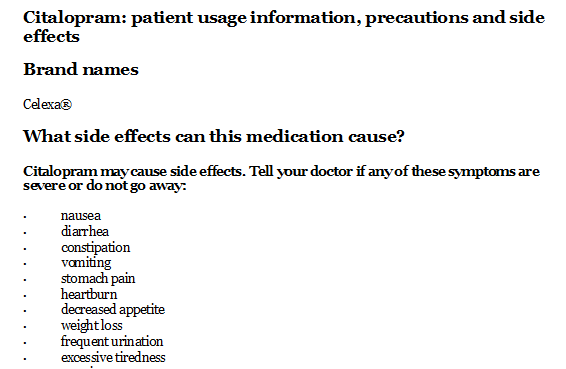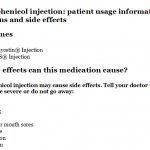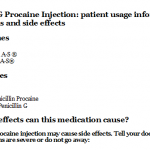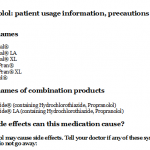
Citalopram: patient usage information, precautions and side effects
Tuesday, May 30, 2017 by Gregory Van Dyke
http://www.naturalnewsreference.com/2017-05-30-citalopram-patient-usage-information-precautions-and-side-effects.html

Citalopram: patient usage information, precautions and side effects
Brand names
Celexa®
What side effects can this medication cause?
Citalopram may cause side effects. Tell your doctor if any of these symptoms are severe or do not go away:
-
nausea
-
diarrhea
-
constipation
-
vomiting
-
stomach pain
-
heartburn
-
decreased appetite
-
weight loss
-
frequent urination
-
excessive tiredness
-
yawning
-
weakness
-
uncontrollable shaking of a part of the body
-
muscle or joint pain
-
dry mouth
-
changes in sex drive or ability
-
heavy menstrual periods
Some side effects can be serious. If you experience any of the following symptoms, or those listed in the IMPORTANT WARNING or SPECIAL PRECAUTIONS sections, call your doctor immediately or get emergency medical treatment:
-
chest pain
-
shortness of breath
-
dizziness
-
fainting
-
fast, slow, or irregular heartbeat
-
hallucinating (seeing things or hearing voices that do not exist)
-
fever
-
excessive sweating
-
confusion
-
coma (loss of consciousness)
-
loss of coordination
-
stiff or twitching muscles
-
hives or blisters
-
rash
-
itching
-
difficulty breathing or swallowing
-
swelling of the face, throat, tongue, lips, eyes, hands, feet, ankles, or lower legs
-
hoarseness
-
unusual bleeding or bruising
-
headache
-
unsteadiness
-
problems with thinking, concentration, or memory
-
seizures
Citalopram may decrease appetite and cause weight loss in children. Your child’s doctor will watch his or her growth carefully. Talk to your child’s doctor if you have concerns about your child’s growth or weight while he or she is taking this medication. Talk to your child’s doctor about the risks of giving citalopram to your child.
Citalopram may cause other side effects. Call your doctor if you have any unusual problems while taking this medication.
If you experience a serious side effect, you or your doctor may send a report to the Food and Drug Administration’s (FDA) MedWatch Adverse Event Reporting program online (http://www.fda.gov/Safety/MedWatch) or by phone (1-800-332-1088).
IMPORTANT WARNING:
A small number of children, teenagers, and young adults (up to 24 years of age) who took antidepressants (‘mood elevators’) such as citalopram during clinical studies became suicidal (thinking about harming or killing oneself or planning or trying to do so). Children, teenagers, and young adults who take antidepressants to treat depression or other mental illnesses may be more likely to become suicidal than children, teenagers, and young adults who do not take antidepressants to treat these conditions. However, experts are not sure about how great this risk is and how much it should be considered in deciding whether a child or teenager should take an antidepressant. Children younger than 18 years of age should not normally take citalopram, but in some cases, a doctor may decide that citalopram is the best medication to treat a child’s condition.
You should know that your mental health may change in unexpected ways when you take citalopram or other antidepressants even if you are an adult over 24 years of age. You may become suicidal, especially at the beginning of your treatment and any time that your dose is increased or decreased. You, your family, or your caregiver should call your doctor right away if you experience any of the following symptoms: new or worsening depression; thinking about harming or killing yourself, or planning or trying to do so; extreme worry; agitation; panic attacks; difficulty falling asleep or staying asleep; aggressive behavior; irritability; acting without thinking; severe restlessness; and frenzied abnormal excitement. Be sure that your family or caregiver knows which symptoms may be serious so they can call the doctor if you are unable to seek treatment on your own.
Your healthcare provider will want to see you often while you are taking citalopram, especially at the beginning of your treatment. Be sure to keep all appointments for office visits with your doctor.
The doctor or pharmacist will give you the manufacturer’s patient information sheet (Medication Guide) when you begin treatment with citalopram. Read the information carefully and ask your doctor or pharmacist if you have any questions. You also can obtain the Medication Guide from the FDA website: http://www.fda.gov/Drugs/DrugSafety/InformationbyDrugClass/UCM096273.
No matter your age, before you take an antidepressant, you, your parent, or your caregiver should talk to your doctor about the risks and benefits of treating your condition with an antidepressant or with other treatments. You should also talk about the risks and benefits of not treating your condition. You should know that having depression or another mental illness greatly increases the risk that you will become suicidal. This risk is higher if you or anyone in your family has or has ever had bipolar disorder (mood that changes from depressed to abnormally excited) or mania (frenzied, abnormally excited mood), or has thought about or attempted suicide. Talk to your doctor about your condition, symptoms, and personal and family medical history. You and your doctor will decide what type of treatment is right for you.
Why is this medication prescribed?
Citalopram is used to treat depression. Citalopram is in a class of antidepressants called selective serotonin reuptake inhibitors (SSRIs). It is thought to work by increasing the amount of serotonin, a natural substance in the brain that helps maintain mental balance.
How should this medicine be used?
Citalopram comes as a tablet and a solution (liquid) to take by mouth. It is usually taken once a day, in the morning or in the evening, with or without food. Take citalopram at around the same time every day. Follow the directions on your prescription label carefully, and ask your doctor or pharmacist to explain any part you do not understand. Take citalopram exactly as directed. Do not take more or less of it or take it more often than prescribed by your doctor.
Your doctor may start you on a low dose of citalopram and gradually increase your dose, not more often than once a week.
It may take 1 to 4 weeks before you notice the full benefit of citalopram. Continue to take citalopram even if you feel well. If you suddenly stop taking citalopram, you may experience withdrawal symptoms such as mood changes, irritability, agitation, dizziness, numbness, tingling or electric shock-like sensations in the hands or feet, anxiety, confusion, headache, tiredness, nausea, sweating, shaking, and difficulty falling asleep or staying asleep. Do not stop taking citalopram without talking to your doctor. Your doctor will probably decrease your dose gradually.
Other uses for this medicine
Citalopram is also sometimes used to treat eating disorders, alcoholism, panic disorder (condition that causes sudden attacks of extreme fear with no apparent cause), premenstrual dysphoric disorder (a group of physical and emotional symptoms that occur before the menstrual period each month), and social phobia (excessive anxiety about interacting with others). Talk to your doctor about the possible risks of using this medication for your condition.
This medication may be prescribed for other uses; ask your doctor or pharmacist for more information.
What special precautions should I follow?
Before taking citalopram,
-
tell your doctor and pharmacist if you are allergic to citalopram, escitalopram (Lexapro), any other medications, or any of the ingredients in the citalopram product you are taking. Talk to your pharmacist or check the Medication Guide for a list of the ingredients.
-
tell your doctor if you are taking pimozide (Orap) or a monoamine oxidase (MAO) inhibitor such as isocarboxazid (Marplan), linezolid (Zyvox), phenelzine (Nardil), selegiline (Eldepryl, Emsam, Zelapar), or tranylcypromine (Parnate), or if you have stopped taking an MAO inhibitor within the past 14 days. Your doctor will probably tell you not to take citalopram. If you stop taking citalopram, you should wait at least 14 days before you start to take an MAO inhibitor.
-
you should know that citalopram is very similar to another SSRI, escitalopram (Lexapro). You should not take these two medications together.
-
tell your doctor and pharmacist what other prescription and nonprescription medications and vitamins you are taking or plan to take. Be sure to mention any of the following: amiodarone (Cordarone); anticoagulants (‘blood thinners’) such as warfarin (Coumadin, Jantoven); aspirin and other nonsteroidal anti-inflammatory drugs (NSAIDs) such as ibuprofen (Advil, Motrin) and naproxen (Aleve, Naprosyn); carbamazepine (Tegretol); cimetidine (Tagamet); cisapride (Propulsid); diuretics (‘water pills); disopyramide (Norpace); dofetilide (Tikosyn); erythromycin (E.E.S. E-Mycin, Erythrocin); heparin; lithium (Eskalith, Lithobid); medications for anxiety, chronic pain, mental illness, Parkinson’s disease, and seizures; medications for migraine headaches such as almotriptan (Axert), eletriptan (Relpax), frovatriptan (Frova), naratriptan (Amerge), rizatriptan (Maxalt), sumatriptan (Imitrex), and zolmitriptan (Zomig); methylene blue; metoprolol (Lopressor, Toprol XL); moxifloxacin (Avelox); omeprazole (Prilosec, Zegerid); other selective serotonin re-uptake inhibitors (SSRI) or serotonin–norepinephrine reuptake inhibitors (SNRI) medications; procainamide (Procanbid, Pronestyl); quinidine (Quinidex); sedatives; sibutramine (Meridia); sleeping pills; sotalol (Betapace); sparfloxacin (Zagam); thioridazine (Mellaril); tramadol (Ultram); tranquilizers; and tricyclic antidepressants such as amitriptyline (Elavil), amoxapine (Asendin), clomipramine (Anafranil), desipramine (Norpramin), doxepin (Adapin, Sinequan), imipramine (Tofranil), nortriptyline (Aventyl, Pamelor), protriptyline (Vivactil), and trimipramine (Surmontil). Your doctor may need to change the doses of your medications or monitor you carefully for side effects. Many other medications may also interact with citalopram, so be sure to tell your doctor about all the medications you are taking, even those that do not appear on this list.
-
tell your doctor what nutritional supplements and herbal products you are taking, especially products that contain St. John’s wort or tryptophan.
-
tell your doctor if you or anyone in your family has or has ever had long QT syndrome (a rare heart problem that may cause irregular heartbeat, fainting, or sudden death) and if you use or have ever used street drugs or have overused prescription medications. Also tell your doctor if you are older than 60 years of age and if you have or have ever had a slow or irregular heartbeat, high blood pressure; bleeding problems; stroke; low levels of magnesium or potassium in your blood, a heart attack, heart failure (condition in which the heart cannot pump enough blood to other parts of the body) or other heart conditions; seizures; or kidney or liver disease. Also tell your doctor if you are experiencing severe vomiting, diarrhea, or sweating, or if you develop these symptoms at any time during your treatment.
-
tell your doctor if you are pregnant, especially if you are in the last few months of your pregnancy, or if you plan to become pregnant or are breast-feeding. If you become pregnant while taking citalopram, call your doctor. Citalopram may cause problems in newborns following delivery if it is taken during the last months of pregnancy.
-
you should know that citalopram may make you drowsy. Do not drive a car or operate machinery until you know how this medication affects you.
-
talk to your doctor about the safe use of alcoholic beverages during your treatment with citalopram. Alcohol can make the side effects of citalopram worse.
-
you should know that citalopram may cause angle-closure glaucoma (a condition where the fluid is suddenly blocked and unable to flow out of the eye causing a quick, severe increase in eye pressure which may lead to a loss of vision). Talk to your doctor about having an eye examination before you start taking this medication. If you have nausea, eye pain, changes in vision, such as seeing colored rings around lights, and swelling or redness in or around the eye, call your doctor or get emergency medical treatment right away.
What special dietary instructions should I follow?
Unless your doctor tells you otherwise, continue your normal diet.
What should I do if I forget a dose?
Take the missed dose as soon as you remember it. However, if it is almost time for the next dose, skip the missed dose and continue your regular dosing schedule. Do not take a double dose to make up for a missed one.
What should I know about storage and disposal of this medication?
Keep this medication in the container it came in, tightly closed, and out of reach of children. Store it at room temperature and away from excess heat and moisture (not in the bathroom). Throw away any medication that is outdated or no longer needed. Talk to your pharmacist about the proper disposal of your medication.
In case of emergency/overdose
In case of overdose, call your local poison control center at 1-800-222-1222. If the victim has collapsed or is not breathing, call local emergency services at 911.
Symptoms of overdose may include the following:
-
dizziness
-
sweating
-
nausea
-
vomiting
-
uncontrollable shaking of a part of the body
-
drowsiness
-
fast, irregular, or pounding heartbeat
-
memory loss
-
confusion
-
seizures
-
coma (loss of consciousness)
-
fast breathing
-
bluish color around mouth, fingers, or fingernails
-
muscle pain
-
dark-colored urine
What other information should I know?
Keep all appointments with your doctor and the laboratory. Your doctor may order certain laboratory tests and electrocardiograms (EKG; a test to monitor your heart rate and rhythm) before you start taking citalopram and during your treatment with this medication.
Do not let anyone else take your medication. Ask your pharmacist any questions you have about refilling your prescription.
It is important for you to keep a written list of all of the prescription and nonprescription (over-the-counter) medicines you are taking, as well as any products such as vitamins, minerals, or other dietary supplements. You should bring this list with you each time you visit a doctor or if you are admitted to a hospital. It is also important information to carry with you in case of emergencies.
Why is this medication prescribed?
How should this medicine be used?
What special precautions should I follow?
What special dietary instructions should I follow?
What should I do if I forget a dose?
What side effects can this medication cause?
What should I know about storage and disposal of this medication?
Tagged Under: Tags: chemical medicine, medication, Pharma, Prescription Medicine





